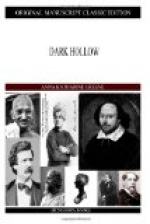“Why, then, did you, on the night of Bela’s death, stop on your way across the bridge to look back upon Dark Hollow and cry in the bitterest tones which escape human lips, ‘Oliver! Oliver! Oliver!’ You were heard to speak this name, Judge Ostrander,” he hastily put in, as the miserable father raised his hand in ineffectual protest. “A man was lurking in the darkness behind you, who both saw and heard you. He may not be the most prepossessing of witnesses, but we cannot discredit his story.”
“Mr. Andrews, you have no children. To the man who has, I make my last appeal. Mr. Renfrew, you know the human heart both as a father and a pastor. Do you find anything unnatural in a guilty soul bemoaning its loss rather than its sin, in the spot which recalled both to his overburdened spirit?”
“No.”
The word came sharply, and it sounded decisive; but the ones which followed from Mr. Andrews were no less so.
“That is not enough. We want evidence, actual evidence that you are not playing the part your son ascribes to you.”
The judge’s eyes glared, then suddenly and incomprehensively softened till the quick fear that his mind as well as his memory had gone astray, vanished in a feeling none of them could have characterised, but which gave to them all an expression of awe.
“I have such evidence,” announced the judge. “Come.”
Turning, he stepped into the hall. Oliver, with bended head and a discouraged mien, quickly followed. Alanson Black and the others, casting startled and inquiring looks at each other, brought up the rear. Deborah Scoville was nowhere to be seen.
At the door of his own room, the judge paused, and with his hand on the curtain, remarked with unexpected composure: “You have all wondered, and others with you why for the last ten years I have kept the gates of my house shut against every comer. I am going to show you.”
And with no further word or look, scarcely even giving attention to Oliver’s anguished presence, he led them into the study and from there on to that inner door known and talked of through the town as the door of mystery. This he slowly opened with the key he took from his pocket; then, pausing with the knob in his hand, he said:
“In the years which are past, but two persons beside myself have crossed this threshold, and these only under my eye. Its secret was for my own breast. Judge what my remorse has been; judge the power of my own secret self-condemnation, by what you see here.”
And, entering, he reached up, and pulled aside the carpet he had strung up over one end of the room, disclosing amid a number of loosened boards, the barred cell of a condemned convict.
“This was my bed, gentlemen, till a stranger coming into my home, made such an acknowledgment of my sin impossible!”
XXXIV
DARK HOLLOW




